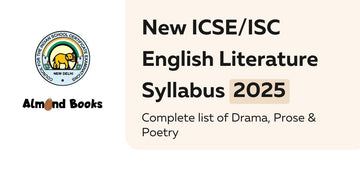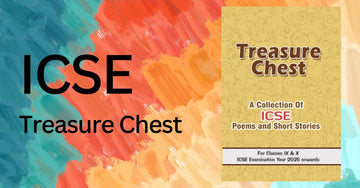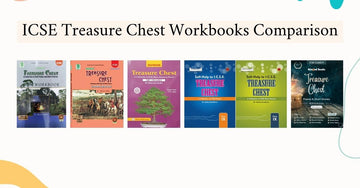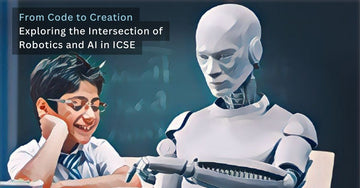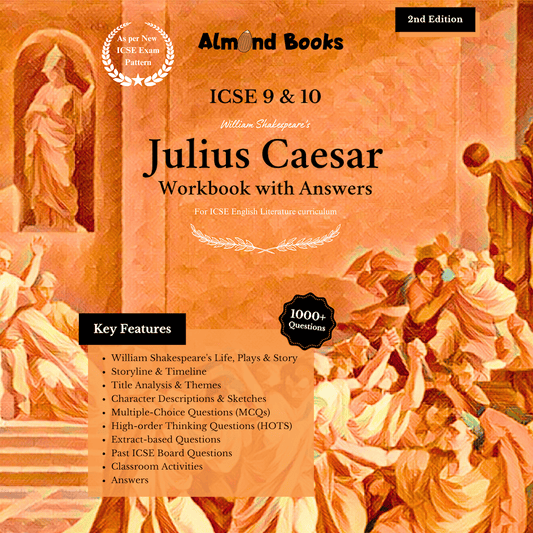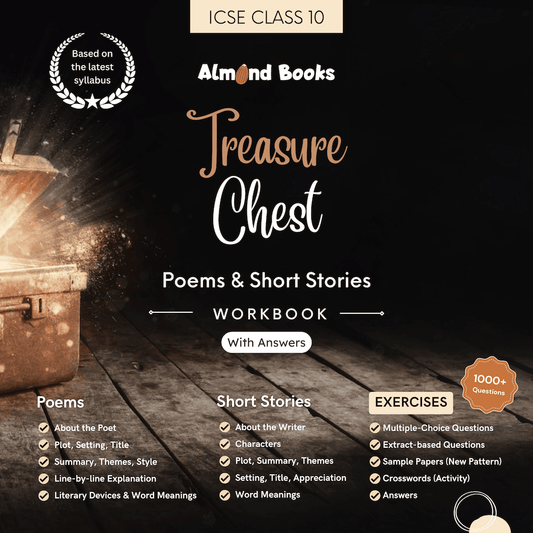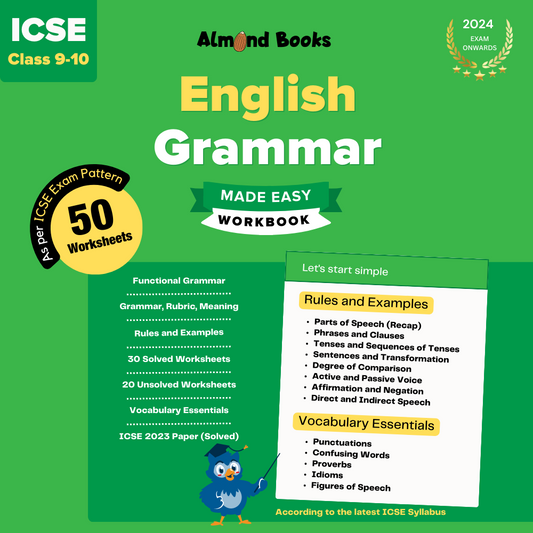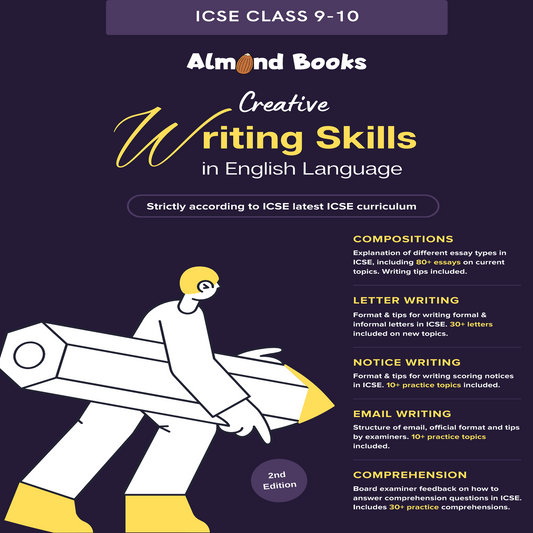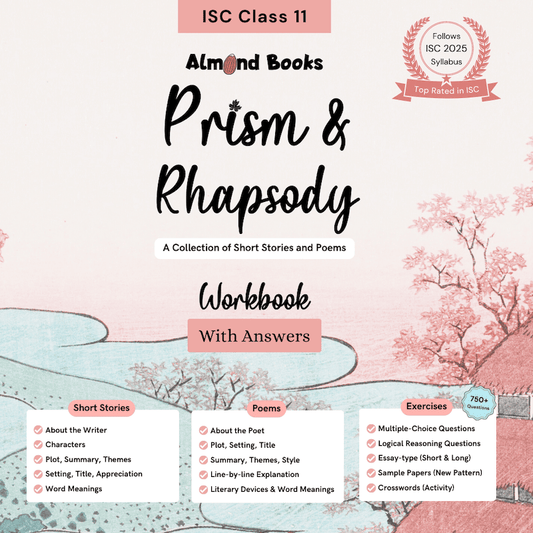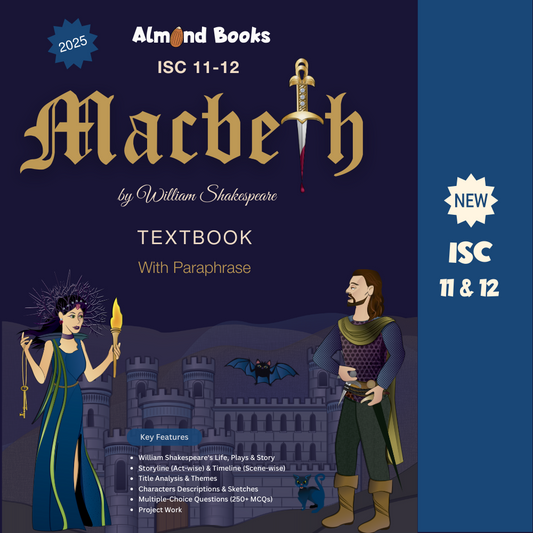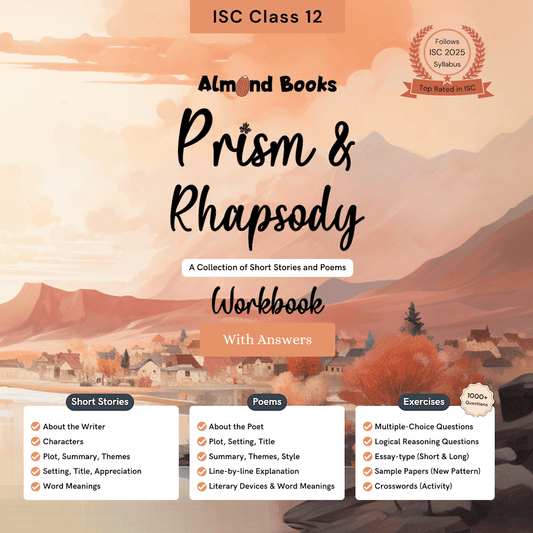The CISCE board has recently announced its new English literature syllabus for the academic year 2025. The syllabus is designed to provide students with a comprehensive understanding of literary texts and develop their critical thinking and analytical skills.
The new syllabus includes a wide range of literary texts from different periods and genres, including poetry, drama, and prose. Students will be exposed to the works of classic authors such as Shakespeare as well as contemporary writers from India and around the world.
Class 9
I. DRAMA: Julius Caesar - William Shakespeare (Acts I & II)
II. TREASURE CHEST: A Collection of ICSE Short Stories & Poems (Evergreen Publications (India) Ltd. New Delhi)
PROSE (Short Stories):
- Bonku Babu's Friend – Satyajit Ray
- Oliver Asks for More – Charles Dickens
- The Model Millionaire – Oscar Wilde
- Home-coming – Rabindranath Tagore
- The Boy who Broke the Bank – Ruskin Bond
POETRY:
- The Night Mail – W.H. Auden
- Skimbleshanks: The Railway Cat – T.S. Eliot
- I Remember, I Remember – Thomas Hood
- A Doctor’s Journal Entry for August 6, 1945 – Vikram Seth
- A Work of Artifice – Marge Piercy
Class 10
I. DRAMA: Julius Caesar: William Shakespeare (Acts III, IV & V)
II. TREASURE CHEST: A Collection of ICSE Short Stories & Poems (Evergreen Publications (India) Ltd. New Delhi)
PROSE (Short Stories):
- With the Photographer – Stephen Leacock
- The Elevator – William Sleator
- The Girl Who Can – Ama Ata Aidoo
- The Pedestrian – Ray Bradbury
- The Last Lesson – Alphonse Daudet
POETRY:
- Haunted Houses – H.W. Longfellow
- The Glove and the Lions – Leigh Hunt
- When Great Trees fall – Maya Angelou
- A Considerable Speck – Robert Frost
- The Power of Music – Sukumar Ray
Download the official syllabus in PDF from CISCE website.
One of the major changes in the new syllabus is the inclusion of more works by Indian authors. The syllabus now includes a greater representation of Indian literature, reflecting the diverse cultural and linguistic heritage of the country. This will provide students with a deeper understanding of Indian literature and its place in the global literary canon.
In addition to the literary texts, the syllabus also includes a section on literary terms and elements, which will help students understand the technical aspects of literary analysis. The syllabus also includes a section on literary criticism, which will help students understand how literary texts are interpreted and evaluated.
Curious to know what each short story and poem is about? Continue reading.
PROSE (Short Stories):
-
Bonku Babu's Friend – Satyajit Ray
"Bonku Babu's Friend" by Satyajit Ray is a story about a young boy named Bonku who befriends a retired school teacher who helps him with his studies.
-
Oliver Asks for More – Charles Dickens
"Oliver Asks for More" by Charles Dickens is a story about an orphan named Oliver Twist who is raised in a workhouse and then sold into apprenticeship with an undertaker. He escapes from there and travels to London, where he meets the Artful Dodger, a member of a gang of juvenile pickpockets led by the criminal Fagin.
-
The Model Millionaire – Oscar Wilde
"The Model Millionaire" by Oscar Wilde is a story about a poor artist who falls in love with a wealthy woman, but she only agrees to marry him if he can become a millionaire. The artist then paints a portrait of a beggar and sells it as a portrait of a millionaire, which allows him to marry the woman he loves.
-
Home-coming – Rabindranath Tagore
"Home-coming" by Rabindranath Tagore is a story about a man who returns to his village after many years away and finds that everything has changed. He struggles to reconnect with his past and find a sense of belonging.
-
The Boy who Broke the Bank – Ruskin Bond
"The Boy who Broke the Bank" by Ruskin Bond is a story about a young boy named Ravi who becomes obsessed with finding a way to break into the local bank. He eventually succeeds in breaking in but soon realises that the thrill of breaking in was not worth the guilt that followed. He then decides to return the money and confess to the police.
-
With the Photographer – Stephen Leacock
"With the Photographer" by Stephen Leacock is a humorous short story about a man who hires a photographer to take his portrait, but the photographer keeps insisting on taking pictures of him in various ridiculous poses.
-
The Elevator – William Sleator
"The Elevator" by William Sleator is a science fiction short story about a boy who gets trapped in an elevator that takes him to different dimensions.
-
The Girl Who Can – Ama Ata Aidoo
"The Girl Who Can" by Ama Ata Aidoo is a story about a young girl who discovers her ability to heal people with her touch and the impact it has on her community.
-
The Pedestrian – Ray Bradbury
"The Pedestrian" by Ray Bradbury is a short story about a man who enjoys taking evening walks, but in a future society where everyone stays inside and is addicted to television, his walks become a crime.
-
The Last Lesson – Alphonse Daudet
"The Last Lesson" by Alphonse Daudet is a short story about a school teacher who is teaching his students for the last time before the Germans take over the village. The story deals with themes of love of teaching, patriotism, and the importance of language.
POETRY:
-
The Night Mail – W.H. Auden
"The Night Mail" by W.H. Auden is a poem that describes a mail train as it travels through the night, connecting distant cities and towns. The poem celebrates the efficiency and power of technology, while also acknowledging the loneliness and isolation that can result from it.
-
Skimbleshanks: The Railway Cat – T.S. Eliot
"Skimbleshanks: The Railway Cat" by T.S. Eliot is a humorous and playful poem that tells the story of a cat named Skimbleshanks who lives on a train and keeps the passengers entertained. The poem highlights the routine and monotony of railway travel, but also the sense of community and companionship that can develop among its passengers.
-
I Remember, I Remember – Thomas Hood
"I Remember, I Remember" by Thomas Hood is a nostalgic and melancholic poem that reflects on the passage of time and the memories of childhood. The poem evokes the feelings of longing and loss as the speaker remembers the sights, sounds, and smells of his past.
-
A Doctor’s Journal Entry for August 6, 1945 – Vikram Seth
"A Doctor's Journal Entry for August 6, 1945" by Vikram Seth is a poem that depicts the devastating aftermath of the atomic bombing of Hiroshima. The poem describes the horror and suffering of the victims through the eyes of a doctor who is trying to save their lives. The poem is a powerful anti-war statement.
-
A Work of Artifice – Marge Piercy
"A Work of Artifice" by Marge Piercy is a feminist poem that critiques the societal expectations placed on women to conform to traditional roles and ideals of beauty. The poem presents a vision of a utopia in which women are free to be themselves and live according to their own desires.
-
Haunted Houses – H.W. Longfellow
"Haunted Houses" by H.W. Longfellow is a poem about the memories and emotions that linger in old houses, long after the inhabitants have gone. The speaker reflects on the ghosts of the past that still haunt the house, and wonders about the lives of the people who once lived there.
-
The Glove and the Lions – Leigh Hunt
"The Glove and the Lions" by Leigh Hunt is a poem that tells the story of a brave knight who throws his glove into a pit of lions as a challenge to the king. The poem is an allegory for the power of courage and the importance of standing up for what one believes in, even in the face of danger.
-
When Great Trees fall – Maya Angelou
"When Great Trees Fall" by Maya Angelou is a poem about the passing of time and the inevitability of change. The speaker reflects on how the fall of a great tree symbolises the end of an era and the loss of something important. The poem ends with a note of hope and the reminder that new growth will come in the wake of the loss.
-
A Considerable Speck – Robert Frost
"A Considerable Speck" by Robert Frost is a poem about the insignificance of the individual in the grand scheme of things. The speaker reflects on a tiny speck on a leaf, and how it serves as a reminder of how small and insignificant one's own problems and worries are in the grand scheme of things.
-
The Power of Music – Sukumar Ray
"The Power of Music" by Sukumar Ray is a poem about the transformative power of music. The speaker reflects on how music can change a person's mood, evoke powerful emotions and memories, and bring people together. The poem concludes with a reminder that music is a universal language that can transcend barriers of language, culture and time.
The new syllabus is designed to be student-centric, and encourages active learning and participation. The board has also introduced a new assessment system, which includes regular class tests and internal assessments, as well as a final examination.
Overall, the new ICSE English literature syllabus for 2025 is a well-rounded and comprehensive curriculum that will provide students with a solid foundation in literary studies. It will help students develop their critical thinking, analytical and communication skills, and prepare them for higher studies in literature and related fields.

